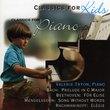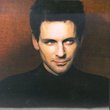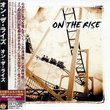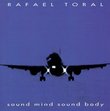| All Artists: Title: The Rostropovich Edition - Dvor�k, Brahms, Haydn, et al Members Wishing: 0 Total Copies: 0 Genre: Classical Styles: Forms & Genres, Concertos, Historical Periods, Classical (c.1770-1830), Modern, 20th, & 21st Century, Instruments, Strings Number of Discs: 3 SwapaCD Credits: 3 UPC: 724356570122 |
Search - :: The Rostropovich Edition - Dvor�k, Brahms, Haydn, et al
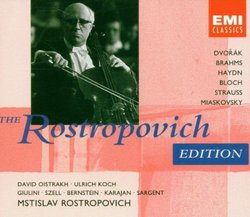 | The Rostropovich Edition - Dvor�k, Brahms, Haydn, et al Genre: Classical This set, featuring Rostropovich in favorite concerted works for cello, is the chief splendor of EMI's Rostropovich Edition. Documenting as it does the playing of the most gifted cellist of our time, in the years in which ... more » |
Larger Image |
CD Details
Synopsis
Amazon.com
This set, featuring Rostropovich in favorite concerted works for cello, is the chief splendor of EMI's Rostropovich Edition. Documenting as it does the playing of the most gifted cellist of our time, in the years in which he was at the peak of his technical ability, it should be of interest to even the most jaded collector. The earliest recording here is of the Miaskovsky Concerto, made in 1956 in EMI's uniquely primitive 1950s stereo. Rostropovich plays the desolate, dreamy work with authority, and Sir Malcolm Sargent and the Philharmonia Orchestra provide a sensitive accompaniment. Aside from the Brahms, the rest of the recordings date from 1975-77, after Rostropovich had left the Soviet Union and was being forced to start life all over again in the West. These include the Haydn concertos, full of panache and personality; the Dvorák concerto with Carlo Maria Giulini and the London Philharmonic, magisterial if not quite as high-voltage as Rostropovich's 1968 account with Karajan; a fulminant Schelomo with Leonard Bernstein and the Orchestre National de France; and, with Karajan and the Berlin Philharmonic, what is still the consummate Don Quixote--swashbuckling and sonorous, full of character, meltingly beautiful, and just a little bit loco. The Brahms Double Concerto, recorded in Cleveland in 1969 with David Oistrakh (violin) and George Szell, is a magnificently powerful performance, chiseled from pure granite, with a grip that almost takes one's breath away, and with thrilling unanimity between Rostropovich and Oistrakh. The recording is tight and dry, but one gets used to it. There's no getting used to this kind of music-making, though. It's simply too remarkable. --Ted Libbey
Similar CDs
| Lindsey Buckingham Out of the Cradle Genres: Pop, Rock, Classic Rock Label: Reprise / Wea | |
| Elliot Goldenthal Cobb Genres: Blues, Soundtracks, Gospel Label: Sony | |

